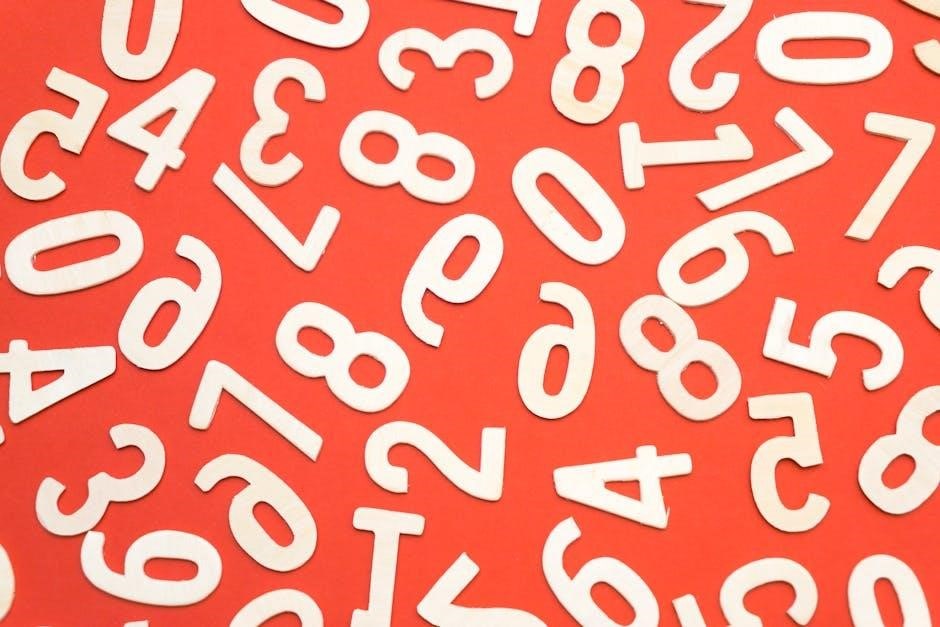Discover the engaging world of mathematical puzzles through curated PDF resources. These puzzles offer fun, challenging problem-solving exercises that enhance math skills and logical thinking for all ages.
What Are Mathematical Puzzles?
Mathematical puzzles are engaging brain teasers that combine numerical and logical challenges. They often involve solving equations, patterns, or riddles using arithmetic, algebra, or geometry. These puzzles are designed to stimulate problem-solving skills and logical thinking. Examples include arithmetic sequences, algebraic equations, and geometric shapes. Logic grid puzzles also fall into this category, requiring deductive reasoning. Mathematical puzzles are versatile, catering to various skill levels, from simple riddles for kids to complex problems for advanced solvers. They are widely used in education to make learning math fun and interactive while sharpening cognitive abilities. PDF resources compile these puzzles, offering convenient access for practice and enjoyment.
Importance of Mathematical Puzzles in Learning
Mathematical puzzles play a vital role in enhancing learning by fostering critical thinking and problem-solving skills. They make math engaging and interactive, encouraging students to approach challenges with curiosity and creativity. Puzzles help build confidence, resilience, and a growth mindset, essential for overcoming academic obstacles. By presenting math in a fun, accessible way, puzzles cater to diverse learning styles and age groups, reducing anxiety and making complex concepts more understandable. Regularly solving mathematical puzzles also improves logical reasoning and mental agility, preparing learners to tackle real-world problems with greater ease and precision.
How to Use PDF Resources for Solving Puzzles
To effectively use PDF resources for solving mathematical puzzles, start by downloading high-quality materials from reputable sources like Crux Mathematicorum or the Journal of Recreational Mathematics. Organize the puzzles by difficulty or type to suit your skill level. Begin with simpler problems to build confidence and gradually move to more complex ones. Use a notebook to jot down your thought process and calculations. Review solutions provided in the PDFs to understand strategies and learn from mistakes. Regular practice with these resources will enhance your problem-solving abilities and deepen your understanding of mathematical concepts.
Popular Types of Mathematical Puzzles in PDFs
Explore a variety of engaging puzzles, including arithmetic, algebraic, geometric, logic grid, and number sequence challenges, all conveniently available in PDF formats for easy access and practice.

Arithmetic Puzzles
Arithmetic puzzles are engaging exercises that focus on basic mathematical operations like addition, subtraction, multiplication, and division. Often presented as riddles or sequences, they challenge problem-solving skills and logical thinking. These puzzles are ideal for improving mental calculation abilities and understanding number relationships. Many PDF resources offer structured arithmetic puzzles, ranging from simple exercises for beginners to complex brain teasers for advanced learners. By solving these puzzles, individuals can enhance their computational speed and accuracy while fostering a deeper appreciation for mathematical concepts. They are a fun and effective way to sharpen arithmetic proficiency at any age or skill level.
Algebraic Puzzles
Algebraic puzzles introduce variables and equations, challenging individuals to solve for unknowns. These puzzles often involve setting up and manipulating equations, fostering critical thinking and logical reasoning. They can range from simple linear equations to more complex quadratic or system-based problems; Many PDF resources provide algebraic puzzles with step-by-step solutions or hints to guide learners. Solving these puzzles enhances problem-solving strategies and prepares individuals for advanced mathematical concepts. They are particularly useful for developing analytical thinking and mathematical fluency, making them a valuable tool for learners of all skill levels. Engaging with algebraic puzzles in PDFs can make learning algebra both enjoyable and rewarding.
Geometric Puzzles
Geometric puzzles engage spatial reasoning and visual understanding, often involving shapes, angles, and patterns. These puzzles may require identifying properties of figures, solving tiling problems, or constructing geometric shapes. PDF resources offer diverse geometric puzzles, from simple shape recognition to complex proofs. They enhance spatial awareness and problem-solving skills, making them ideal for visual learners. Solving geometric puzzles fosters creativity and mathematical intuition, while also providing insights into real-world applications. Many PDFs include interactive diagrams and step-by-step solutions, making them a practical tool for mastering geometric concepts in an engaging and structured manner. They are perfect for learners seeking to deepen their understanding of geometry through interactive challenges.
Logic Grid Puzzles
Logic grid puzzles, often found in PDF resources like Crux Mathematicorum and the Journal of Recreational Mathematics, challenge solvers to deduce solutions using deductive reasoning. These puzzles typically involve organizing information in a grid or table, where clues help narrow down possibilities. They require careful analysis and cross-referencing of details, making them excellent for sharpening analytical thinking. Many logic grid puzzles are designed to be solved systematically, with each clue building on the previous one. PDFs often include step-by-step solutions and interactive diagrams, making them ideal for learners seeking to improve their problem-solving strategies and logical reasoning skills.
Benefits of Solving Mathematical Puzzles
Solving mathematical puzzles enhances problem-solving skills, logical thinking, and mathematical confidence. They foster analytical thinking and mental sharpness, making math enjoyable and rewarding for learners of all ages.
Improving Problem-Solving Skills
Engaging with mathematical puzzles sharpens critical thinking and enhances problem-solving abilities. By tackling arithmetic, algebraic, and logic-based challenges, individuals develop systematic approaches to break down complex problems. These puzzles encourage analytical reasoning, fostering creativity in finding solutions. Regular practice builds resilience and adaptability, essential for overcoming mathematical and real-world obstacles. The structured nature of puzzles helps learners identify patterns, simplify tasks, and evaluate outcomes effectively. This skill development is transferable to various academic and professional scenarios, making mathematical puzzles a valuable tool for intellectual growth and practical application.
Enhancing Logical Thinking
Mathematical puzzles are powerful tools for sharpening logical thinking and deductive reasoning. By solving arithmetic, algebraic, and logic-based challenges, individuals refine their ability to analyze patterns, identify relationships, and draw conclusions. These puzzles often require systematic reasoning, fostering mental clarity and precision. Regular engagement with such exercises strengthens cognitive abilities, enabling better decision-making and analytical skills. Logical thinking is further enhanced through exposure to diverse problem types, from number sequences to grid puzzles, each requiring a unique approach. This mental training not only improves academic performance but also enhances everyday problem-solving capabilities, making it an invaluable skill for lifelong learning and personal growth.
Boosting Mathematical Confidence
Engaging with mathematical puzzles is a proven way to build confidence in math abilities. These puzzles create a positive environment for learning, allowing individuals to tackle challenges without fear of failure; By solving progressively difficult problems, users gain a sense of accomplishment and develop a stronger belief in their mathematical skills. The variety of puzzles, from arithmetic to algebraic, caters to different learning styles, ensuring everyone can find success. This confidence boost translates into improved performance in academic and real-world math applications, fostering a lifelong appreciation for problem-solving and critical thinking.

Top Resources for Mathematical Puzzles PDF
Explore curated PDF resources offering a variety of engaging mathematical puzzles. These collections cater to diverse skill levels, enhancing problem-solving skills and making math enjoyable for learners of all ages.
Crux Mathematicorum
Crux Mathematicorum is a renowned resource for mathematical enthusiasts, offering a diverse range of challenging puzzles and problems. Its “Mathematical Mayhem” column features intriguing arithmetic, algebraic, and logic-based puzzles designed to stimulate critical thinking. Ideal for students and math lovers alike, it bridges basic concepts with advanced mathematical reasoning. Each issue provides detailed solutions, fostering a deeper understanding of problem-solving techniques. This PDF resource is a must-have for anyone seeking to enhance their mathematical skills through engaging and intellectually stimulating exercises.
Journal of Recreational Mathematics
The Journal of Recreational Mathematics is a leading publication that combines mathematical puzzles with educational value. It features a wide array of logic grid puzzles, arithmetic games, and math riddles designed for various skill levels. The journal is particularly noted for its ability to connect complex mathematical concepts to everyday situations, making them accessible and engaging. Each issue includes detailed solutions and study guides, allowing learners to deepen their understanding. This resource is a must-have for educators and enthusiasts alike, offering a blend of intellectual challenge and enjoyment that fosters a lifelong appreciation for mathematics.
Pi Mu Epsilon Journal
The Pi Mu Epsilon Journal is a prestigious publication dedicated to advancing mathematical knowledge and problem-solving skills. It features a diverse collection of mathematical puzzles, including logic grid puzzles, algebraic challenges, and geometric brain teasers. Designed for both students and professionals, the journal offers puzzles ranging from basic to advanced levels, catering to a wide audience. Each issue includes detailed explanations and solutions, making it an excellent resource for learners seeking to enhance their mathematical proficiency. The journal also highlights the recreational aspects of mathematics, encouraging a deeper appreciation for the subject while providing intellectual stimulation.

How to Create Your Own Mathematical Puzzles
Design engaging puzzles by using real-life scenarios, incorporating basic math concepts, and tailoring difficulty levels for different age groups to foster problem-solving skills and creativity.
Using Everyday Situations
Transform ordinary scenarios into engaging mathematical puzzles by incorporating real-life contexts. For instance, turn grocery shopping into a budget puzzle or use cooking measurements to create arithmetic challenges. These relatable situations make math more accessible and fun, encouraging problem-solving skills in practical ways. By drawing from daily experiences, puzzles become relevant and easier to understand, helping learners connect math to their surroundings. This approach fosters creativity and critical thinking while making learning enjoyable and impactful for all age groups.
Incorporating Basic Math Concepts
Mathematical puzzles often rely on fundamental concepts like arithmetic, algebra, and geometry. By integrating these basics, puzzles provide a fun way to practice essential skills. For example, arithmetic puzzles might involve sequences or missing numbers, while algebraic puzzles introduce simple equations. Geometric puzzles often focus on shapes and spatial reasoning. These puzzles help build a strong math foundation while fostering logical thinking and problem-solving abilities. They are designed to be engaging, making learning enjoyable and effective for learners of all levels. This approach ensures that even complex math concepts are introduced in an accessible and entertaining manner.
Designing Puzzles for Different Age Groups
Creating mathematical puzzles tailored to different age groups ensures they are both challenging and appropriate. For younger children, puzzles should focus on basic arithmetic and visual problem-solving, using simple, engaging formats. Teenagers can handle more complex algebra and geometry puzzles that align with their curriculum. Adults may enjoy advanced logic and numerical challenges. By adjusting difficulty and incorporating age-relevant themes, puzzles become more effective and enjoyable. This approach fosters mathematical confidence and problem-solving skills across all age groups, making learning math a fun and accessible experience for everyone.

Exploring mathematical puzzles through PDF resources offers a fun, engaging way to enhance problem-solving skills and foster a deeper love for mathematics at all levels.
Final Thoughts on Mathematical Puzzles
Mathematical puzzles are a delightful way to engage with numbers and logic, offering both entertainment and intellectual growth. They challenge the mind, foster creativity, and provide a sense of accomplishment with each solution. Whether you’re a student looking to improve math skills or an enthusiast seeking fun, these puzzles cater to all ages and skill levels. By exploring resources like Crux Mathematicorum and Journal of Recreational Mathematics, you can uncover a world of problem-solving joy that makes mathematics accessible and enjoyable for everyone.
Encouragement to Explore More Puzzles
Embrace the joy of mathematical puzzles and unlock a world of cognitive growth and entertainment. These engaging exercises are designed to challenge and inspire, offering something for every skill level. From arithmetic riddles to logic grids, puzzles foster problem-solving abilities and enhance mathematical confidence. By exploring diverse resources like Crux Mathematicorum and Pi Mu Epsilon Journal, you can discover a wealth of activities that make learning math fun and rewarding. Dive into the world of puzzles today and experience the thrill of mathematical discovery!
